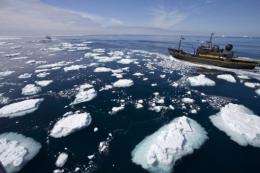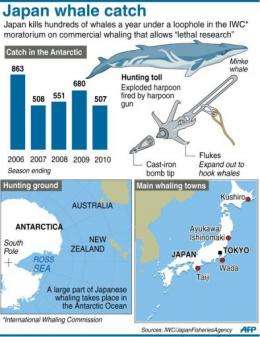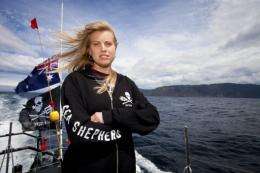Saving whales a cold comfort job

The job description is forbidding: "No pay, Long hours, Hard work, Dangerous conditions, Extreme weather." So intense is the work environment, officials fear that someone may one day die on duty.
But if Georgie Dicks hadn't been prepared to brave towering waves, howling winds and Japanese harpoon ships to save whales from slaughter in Antarctic waters, she would never have volunteered to be an activist.
"We've always got our lives on the line and if we can't accept that, we really shouldn't be here," the 23-year-old told AFP from onboard the Steve Irwin, a vessel owned by the militant Sea Shepherd Conservation Society.
About 1,000 people apply each year to work on a Sea Shepherd ship aiming to save whales from ending up on Japanese dinner plates.
The position involves spending months in one of the most inhospitable places on earth and, while it promises the experience of a lifetime, "whiners, malcontents, mattress lovers, and wimps" are asked not to apply.
Dicks agrees that the campaign so far has been thrilling in parts, particularly when her boat was crashing through ice packs in the Southern Ocean as the volunteers confronted Japanese whalers earlier this month.

"Yeah, I was scared for my life," she admitted. "But you know you just accept what happens to your life and that's that."
"That was a fully intense day. It was so exciting and thrilling to finally feel like I was actually doing something to help stop the whaling."
She says the risks are more than compensated for by the possibility of saving the giant mammals from being killed under a loophole in an international moratorium that allows them to be hunted for "scientific research".
"Saving whales, I've wanted to do that since I was six," says Dicks, who as a deckhand spends much of her time cleaning the boat.
Sea Shepherd activists are known for their clashes with the whalers, and in seven expeditions under the keen eye of Captain Paul Watson have often attempted to put themselves between the whales and the harpoons.
The harassment campaign escalated in January 2010 when the group's futuristic carbon-and-kevlar powerboat, the trimaran Ady Gil, sank after a collision with the Japanese fleet's security ship the Shonan Maru II.
Officials have warned they fear someone could be killed in the ongoing anti-whaling protests in the harsh and remote Southern Ocean.
"We come down here accepting that there are risks, that there are dangers and we know it's a dangerous job and we're happy to do it to try to preserve this bit of our planet for our kids and kids' futures," says Doug O'Neil, another volunteer on the Steve Irwin.
The 37-year-old says that while he misses his partner and young children, who are in the Tasmanian capital Hobart, the experience has been worth it.

As the ship's communications officer, O'Neil is able to use his skills as an IT worker and is in charge of its radio, computer and satellite systems as well as the electronics on the bridge and email security.
"I applied because I thought that something needed to be done and I wanted to be able to assist any way I could," he told AFP. "It's an interesting job, sometimes very hectic, sometimes very monotonous."
Kevin McGinty, 47, says he has no qualms about being a volunteer on the Sea Shepherd's 'Godzilla' speedboat, a 33-metre (100-foot) stabilised monohull given the Japanese name for the giant monster -- Gojira.
"It's an evil vessel," he says of the black boat, which previously completed a round-the-world voyage in less than 80 days under the name Cable & Wireless Adventure. "The boat handles the rough weather really well."
McGinty, who owns a small electrical contracting business in the west Australian city of Fremantle, said he ended up on this season's campaign after assisting with electrical works on Sea Shepherd boats in port.
He believes the volunteers are doing what the Australian government should be doing -- supporting Australia's strong anti-whaling policy.
"I just think the Sea Shepherd organisation, with their direct action approach, is the most effective conservation organisation on the face of the earth," he told AFP from Hobart where the Gojira was refuelling.
But even McGinty laughs about the conditions during the campaign which can stretch to three months: "If you want no pay and tough conditions, you're in the right spot," he jokes.
Dicks too concedes there are some things she misses -- such as fresh fruit and vegetables -- and that the 40-knot winds and rough conditions can be harsh, but she says the campaign has given her moments she will never forget.
She mentions one crisp, cool day when the boat was moving through icebergs and a few fin and humpback whales popped up.
"It was really a weird time because the harpoon ships were on the horizon," Dicks recalls. "Just to see these beautiful animals here and to know that we think of these whales so differently to how they think of them. It was just one of those moments... an epiphany."
(c) 2011 AFP




















